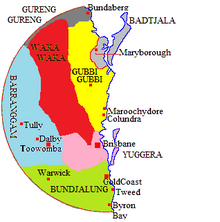Taribelang language
| Bunda | |
|---|---|
| Native to | Australia |
| Region | Queensland |
| Ethnicity | Bunda, ?Taribelang |
Native speakers | 0 <100 L2 or L3 speakers |
Pama–Nyungan
| |
| Dialects |
|
| Language codes | |
| ISO 639-3 | gnr |
| Glottolog | gure1255 |
| AIATSIS[1] | E33 E32, E33 Gureng-Gureng, Taribelang, E36 Goeng-Goeng |
| ELP | Gureng Gureng |
Taribelang, also known as Bunda, Gureng-Gureng is a language of Queensland. Although no longer spoken as a native language by the Taribelang or Bunda people, it is spoken as a 2nd or 3rd language by under 100. There exists some confusion between Austlang's (AIATSIS) E33: Taribelang and E36: Goeng Goeng languages.[2]
Phonology
[edit]Consonants
[edit]| Peripheral | Laminal | Apical | ||
|---|---|---|---|---|
| Labial | Velar | Palatal | Alveolar | |
| Plosive | b | ɡ | ɟ | d |
| Nasal | m | ŋ | ɲ | n |
| Rhotic | r | |||
| Lateral | l | |||
| Approximant | w | j | ||
Vowels
[edit]| Front | Central | Back | |
|---|---|---|---|
| Close | i iː | u uː | |
| Mid | e eː | ||
| Open | a aː |
Accent
[edit]Today some speakers have a "heavier" more guttural way of speaking, e.g. rolling the tongue when pronouncing the "rr's", starting words with Ng rather than a single N and also heavier speakers sound out a "dj" sound rather than "ch" or "t". "Heavier" speakers tend to be the more western groups from along the Burnett River of Queensland.
The more coastal families today seem to have a "lighter" way of speaking (less guttural & not rolling the tongue and using the single N at the start of words rather than the Ng & using "ch" & "t" rather than "dj" etc.) which is most likely the result of the influence of the English language in recent times.

Language revival
[edit]Since 2017, the Central Queensland Language Centre has been working on helping to restore three languages from the region – Yiiman, Byelle (Biyali) and Taribelang.[4] As of 2020[update], Taribelang is one of 20 languages prioritised as part of the Priority Languages Support Project, being undertaken by First Languages Australia and funded by the Department of Communications and the Arts. The project aims to "identify and document critically-endangered languages — those languages for which little or no documentation exists, where no recordings have previously been made, but where there are living speakers".[5]
References
[edit]- ^ E33 E32, E33 Gureng-Gureng, Taribelang at the Australian Indigenous Languages Database, Australian Institute of Aboriginal and Torres Strait Islander Studies (see the info box for additional links)
- ^ "Austlang". AIATSIS.
- ^ Jolly, Lesley (1994). Gureng Gureng : A Language Program Feasibility Study. Brisbane: University of Queensland.
- ^ Wang, Amy Chien-Yu; Apostolou, Panos (2 July 2017). "Indigenous languages at risk". SBS Greek. Special Broadcasting Service. Retrieved 13 January 2020.
- ^ "Priority Languages Support Project". First Languages Australia. Retrieved 13 January 2020.
External links
[edit]- Bibliography of Gureng Gureng people and language resources, at the Australian Institute of Aboriginal and Torres Strait Islander Studies
- Lois Blackman digital story, State Library of Queensland. Digital story discussing the Gurang Gurang dialect
| |||||||||||||||||||||||||
| |||||||||||||||||||||||||
| |||||||||||||||||||||||||
| |||||||||||||||||||||||||
| |||||||||||||||||||||||||
| |||||||||||||||||||||||||
| |||||||||||||||||||||||||
| |||||||||||||||||||||||||
Text is available under the CC BY-SA 4.0 license; additional terms may apply.
Images, videos and audio are available under their respective licenses.
